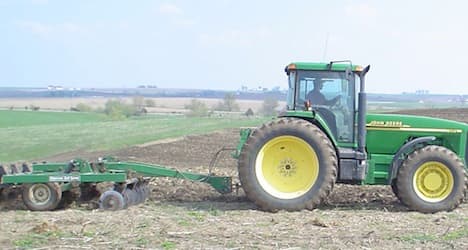Swiss scientists tout unploughed field pluses

If Europe adopted a style of farming that abstains from ploughing after a harvest, local temperatures could drop as much as two degrees, Swiss and French researchers said on Monday.
The reason lies in the colour of the soil: untilled land is lighter and reflects sunlight, making the area cooler than it is when dark surfaces are present, according to scientists, including those from the Institute for Atmospheric and Climate Science in Zurich.
Fields that are ploughed also dry out faster.
In contrast, untilled land allows moisture to evaporate more slowly and can contribute to cooling.
The effects could be particularly noticeable during hot spells, said the findings in the Proceedings of the National Academy of Sciences, a peer-reviewed US journal.
"For heatwave summer days the local cooling effect gained from no-till practice is of the order of 2 degrees Celsius," said the study led by scientists in Switzerland and France.
Researchers found that the unploughed stubble of wheat fields helped reflect 30 percent of incoming sunlight, compared to just 20 percent in ploughed fields.
Computer models showed that the difference could translate to a difference of two degrees Celsius on hot days, though the effects would stay largely local.
"In other words, if all French farmers were to stop ploughing up their fields in summer, the impact on temperatures in Germany would be negligible," said Sonia Seneviratne, professor of land-climate dynamics at Zurich's Institute for Atmospheric and Climate Science.
Advocates of no-till farming say the practice could bring even more benefits, such as saving water, preventing soil erosion and even curbing global warming.
The US Department of Agriculture, in a 2010 report, said the practice could "sequester substantial amounts of carbon" by helping the Earth contain more carbon, thereby cutting greenhouse gas emissions that drive global warming.
But critics contend the practice leads to an increase in the use of chemical herbicides, since the weed-killing benefit brought by ploughing is lost.
No-till farming has gained in popularity in the United States and South America, home to some 85 percent of the globe's unploughed farmland.
Europe, despite being one of the most densely cultivated regions in the world, is home to just two percent of the planet's unploughed fields, according to researchers.
Comments
See Also
The reason lies in the colour of the soil: untilled land is lighter and reflects sunlight, making the area cooler than it is when dark surfaces are present, according to scientists, including those from the Institute for Atmospheric and Climate Science in Zurich.
Fields that are ploughed also dry out faster.
In contrast, untilled land allows moisture to evaporate more slowly and can contribute to cooling.
The effects could be particularly noticeable during hot spells, said the findings in the Proceedings of the National Academy of Sciences, a peer-reviewed US journal.
"For heatwave summer days the local cooling effect gained from no-till practice is of the order of 2 degrees Celsius," said the study led by scientists in Switzerland and France.
Researchers found that the unploughed stubble of wheat fields helped reflect 30 percent of incoming sunlight, compared to just 20 percent in ploughed fields.
Computer models showed that the difference could translate to a difference of two degrees Celsius on hot days, though the effects would stay largely local.
"In other words, if all French farmers were to stop ploughing up their fields in summer, the impact on temperatures in Germany would be negligible," said Sonia Seneviratne, professor of land-climate dynamics at Zurich's Institute for Atmospheric and Climate Science.
Advocates of no-till farming say the practice could bring even more benefits, such as saving water, preventing soil erosion and even curbing global warming.
The US Department of Agriculture, in a 2010 report, said the practice could "sequester substantial amounts of carbon" by helping the Earth contain more carbon, thereby cutting greenhouse gas emissions that drive global warming.
But critics contend the practice leads to an increase in the use of chemical herbicides, since the weed-killing benefit brought by ploughing is lost.
No-till farming has gained in popularity in the United States and South America, home to some 85 percent of the globe's unploughed farmland.
Europe, despite being one of the most densely cultivated regions in the world, is home to just two percent of the planet's unploughed fields, according to researchers.
Join the conversation in our comments section below. Share your own views and experience and if you have a question or suggestion for our journalists then email us at [email protected].
Please keep comments civil, constructive and on topic – and make sure to read our terms of use before getting involved.
Please log in here to leave a comment.